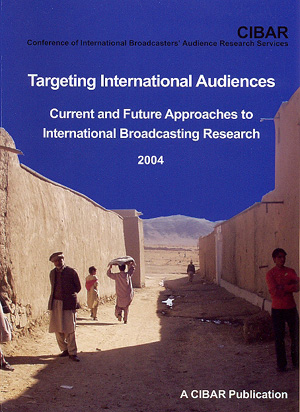CIBAR stands for "Conference of International Broadcasters'
Audience Research Services", a worldwide association of researchers in international broadcasting. Volume 3 of the CIBAR conference proceedings series contains expanded and updated
articles that were originally presented at CIBAR's 20th annual meeting in London (2004).
Excerpt from introduction:
If international broadcasting research only a few years ago was primarily concerned with
deriving basic measurements of audience size and behavior for radio
broadcasting, it now must function in a multiple media world of radio (using a
variety of delivery mechanisms), the Internet, television and cell phones. And
if possible, to present findings based on single-source data so that the multi-faceted
behavior of individual media consumers can be better understood.
Contains the following articles:
R. Eugene Parta: Introduction
Graham Mytton: CIBARís 20th Annual Conference: Looking Back
and Looking Forward
Understanding Audiences
Alan Booth: From Audit to Insight. Some Remarks on a New Paradigm in Applied Market Research
Hugh Hope-Stone: Great Programme, But Did They Learn Anything? Evaluating the Learning Value of Educational Programming
R. Eugene Parta: Surveying Travelers From the USSR During the Cold War. Attempting to Understand an Inaccessible Audience
Sampling and Fieldwork Issues: Case Studies
Mark Eggerman: Questions for Afghanistan? The Impact of Cultural, Social and Educational Factors on Research
Matthew Warshaw: Building Face-to-Face Research Capacity. Fieldwork in Iraq and Afghanistan
Hugh Barton: Conducting an Audience Survey in Rural Locations. Setting Up Research in Mozambique
William Bell: Measuring Audiences for Voice of America Television Programs. Results From a Survey in Kenya
Lewis Harper: Radio Free Asiaís Reality Check for Political Risk. 'Hard Hat' Aspects of Audience Research
Roland Schuerhoff: Up the Creek Without a Paddle? Is There a Way for Smaller International Stations to
Substantial Grounded Information About Audiences' Opinions and Wishes?
Valentina Zlobina: Positioning a New International Radio Service. Target-Group Research for Russian International Radio
Oliver Zöllner: Generating Samples of Diasporic Minority Populations. A Chilean Example
[See full article]
Impacts of Technology
Graham Mytton: International Radio Continues to Depend on Shortwave. An Evaluation of Its Myths of Decline
Colin M Wilding: Shortwave: Facing the Facts. Broadcasters Must Adapt to Audiences' Changing Needs
Mark Rhodes: Cell Phone Use and Technology in China. Perspectives for International Broadcasters
Online Research Issues
Kevin Cowan: Engaging Audiences Through Research. The 'Pulse of Africa': A Continent Speaks
James S. Morrow: Internet Performance Measurement. The Broadcasting Board of Governors Approach
Kenneth R. Donow: Creating an Internet Effectiveness Index. What Are Appropriate Measurements for Evaluating Transnational Web Sites?
